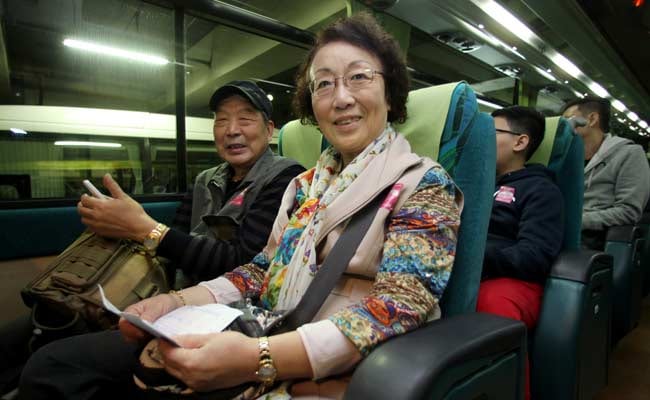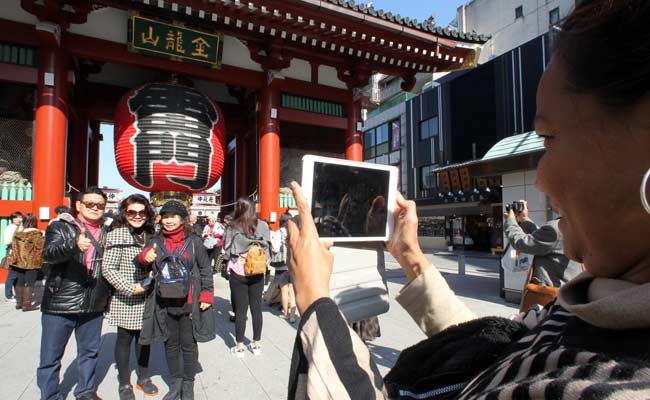
Chinese-speaking tourists on a coach at the Hamamatsucho bus terminal during a sightseeing tour operated by Hato Bus Co. in Toyko November 5. Image courtesy: Junko Kimura-Matsumoto/Bloomberg News
Tokyo:
London isn't the only city with an iconic bus.
In Tokyo it's yellow, named after a pigeon, and should be a welcome sight to stock investors. That's because Hato Bus Co.'s seats are increasingly filled with Chinese sightseers, giving the company reason to be optimistic that the slowdown in Asia's largest economy will do little to stem the record visitors to Japan under Prime Minister Shinzo Abe. While Hato Bus isn't listed, traders have flocked to tourism shares, a bright spot in a struggling economy.
"Chinese customers are still increasing," said President Yasushi Nakamura from company headquarters, hidden in a sprawl of factories and warehouses on land reclaimed from Tokyo Bay. Rows of lemon-colored buses stand outside the window. "It's not so affected by the economy."
Sales of Chinese-language tours surged 77 percent last quarter, six times the growth pace of ones in English, and bookings are up compared with the same time last year, Nakamura says. Hato Bus has been running tours around the capital since after the second world war, when its target market was western dignitaries with access to gasoline. Now Nakamura sees Asian visitors as its future.
Tourism is one of Abe's clearest successes, spurred by a weaker yen and relaxed rules on visas. The government's so close to achieving a target of 20 million visitors by 2020, the year of the Tokyo Olympics, that it's decided to set a new goal this fiscal year. In the nine months through September, 14.5 million people entered the country, already beating last year's record.
Stock investors have taken notice. Shares of Isetan Mitsukoshi Holdings, which operates department stores including in the famous Ginza shopping district, soared 149 percent under Abe through Nov. 11, against a 90 percent gain for the benchmark Topix index. Laox Co., a Chinese-owned operator of duty-free stores, surged more than 1,000 percent. A gauge of airlines has more than doubled, helped also by cheaper oil, as has Imperial Hotel Ltd., which provides high-end accommodation in the capital and Osaka. The Topix slid 0.1 percent on Thursday in Tokyo.

Hato Bus, part owned by the Tokyo metropolitan government, was founded in 1948 during the Allied occupation of Japan. The word hato means pigeon or dove, and according to Nakamura, the company picked it to symbolize a peaceful Japan and the speed and reliability of a carrier pigeon. More than 90 percent of customers today come from within Japan, many from the regions.
Still, Nakamura sees Asian tourists as the company's biggest growth area. He says the company aims to more than double foreign passengers to 200,000 a year by 2020, and to focus more on Asia after the Olympics. Hato Bus started Chinese- language tours in 2006 and now has 26 such routes, according to the company's website.
"They really like Mount Fuji," said Nakamura, 61, previously a bureaucrat with the Tokyo government. He notes that more courses for Chinese tourists go outside the capital compared with those guided in English. "Shopping is also part of these tours and we have a dedicated shopping course for them," he said. "Part of our quality is we don't push them into shopping, but they request it."
Tourist cash is especially welcome as economists predict Japan will fall back into recession when it reports quarterly gross domestic product on Nov. 16. Foreign visitors spent a record 1 trillion yen ($8.1 billion) in the three months through September, the Japan Tourism Agency said last month, with Chinese visitors accounting for 47 percent of that.
"The reasons to favor the tourism theme remain in place: a durably weak currency, rising wages in emerging Asia, and active promotion of tourism by the Abe administration," Societe Generale equity strategists led by Frank Benzimra wrote in a note to clients on Nov. 6.
Societe Generale says the Japan tourism story is just starting. Government data also suggest room for further growth. Japan ranked 22nd in the world for foreign visitors last year, despite having the third-largest economy. It was seventh in Asia, behind Malaysia, Macau and South Korea.
In fact, if anyone thinks there are too many tourists from China in Japan, it might be the Chinese themselves.
Some of them moan that "Japan is full of Chinese," Nakamura says. "They ask to go to places with none. That's a difficult one to handle."
© 2015 Bloomberg L.P.
In Tokyo it's yellow, named after a pigeon, and should be a welcome sight to stock investors. That's because Hato Bus Co.'s seats are increasingly filled with Chinese sightseers, giving the company reason to be optimistic that the slowdown in Asia's largest economy will do little to stem the record visitors to Japan under Prime Minister Shinzo Abe. While Hato Bus isn't listed, traders have flocked to tourism shares, a bright spot in a struggling economy.
"Chinese customers are still increasing," said President Yasushi Nakamura from company headquarters, hidden in a sprawl of factories and warehouses on land reclaimed from Tokyo Bay. Rows of lemon-colored buses stand outside the window. "It's not so affected by the economy."
Sales of Chinese-language tours surged 77 percent last quarter, six times the growth pace of ones in English, and bookings are up compared with the same time last year, Nakamura says. Hato Bus has been running tours around the capital since after the second world war, when its target market was western dignitaries with access to gasoline. Now Nakamura sees Asian visitors as its future.
Tourism is one of Abe's clearest successes, spurred by a weaker yen and relaxed rules on visas. The government's so close to achieving a target of 20 million visitors by 2020, the year of the Tokyo Olympics, that it's decided to set a new goal this fiscal year. In the nine months through September, 14.5 million people entered the country, already beating last year's record.
Stock investors have taken notice. Shares of Isetan Mitsukoshi Holdings, which operates department stores including in the famous Ginza shopping district, soared 149 percent under Abe through Nov. 11, against a 90 percent gain for the benchmark Topix index. Laox Co., a Chinese-owned operator of duty-free stores, surged more than 1,000 percent. A gauge of airlines has more than doubled, helped also by cheaper oil, as has Imperial Hotel Ltd., which provides high-end accommodation in the capital and Osaka. The Topix slid 0.1 percent on Thursday in Tokyo.

Foreign tourists pose for photographs in front of Kaminarimon Gate in Tokyo's Asakusa district during a sightseeing tour operated by Hato Bus Co. Image courtesy: Junko Kimura-Matsumoto/Bloomberg News
Hato Bus, part owned by the Tokyo metropolitan government, was founded in 1948 during the Allied occupation of Japan. The word hato means pigeon or dove, and according to Nakamura, the company picked it to symbolize a peaceful Japan and the speed and reliability of a carrier pigeon. More than 90 percent of customers today come from within Japan, many from the regions.
Still, Nakamura sees Asian tourists as the company's biggest growth area. He says the company aims to more than double foreign passengers to 200,000 a year by 2020, and to focus more on Asia after the Olympics. Hato Bus started Chinese- language tours in 2006 and now has 26 such routes, according to the company's website.
"They really like Mount Fuji," said Nakamura, 61, previously a bureaucrat with the Tokyo government. He notes that more courses for Chinese tourists go outside the capital compared with those guided in English. "Shopping is also part of these tours and we have a dedicated shopping course for them," he said. "Part of our quality is we don't push them into shopping, but they request it."
Tourist cash is especially welcome as economists predict Japan will fall back into recession when it reports quarterly gross domestic product on Nov. 16. Foreign visitors spent a record 1 trillion yen ($8.1 billion) in the three months through September, the Japan Tourism Agency said last month, with Chinese visitors accounting for 47 percent of that.
"The reasons to favor the tourism theme remain in place: a durably weak currency, rising wages in emerging Asia, and active promotion of tourism by the Abe administration," Societe Generale equity strategists led by Frank Benzimra wrote in a note to clients on Nov. 6.
Societe Generale says the Japan tourism story is just starting. Government data also suggest room for further growth. Japan ranked 22nd in the world for foreign visitors last year, despite having the third-largest economy. It was seventh in Asia, behind Malaysia, Macau and South Korea.
In fact, if anyone thinks there are too many tourists from China in Japan, it might be the Chinese themselves.
Some of them moan that "Japan is full of Chinese," Nakamura says. "They ask to go to places with none. That's a difficult one to handle."
© 2015 Bloomberg L.P.
Track Latest News Live on NDTV.com and get news updates from India and around the world

